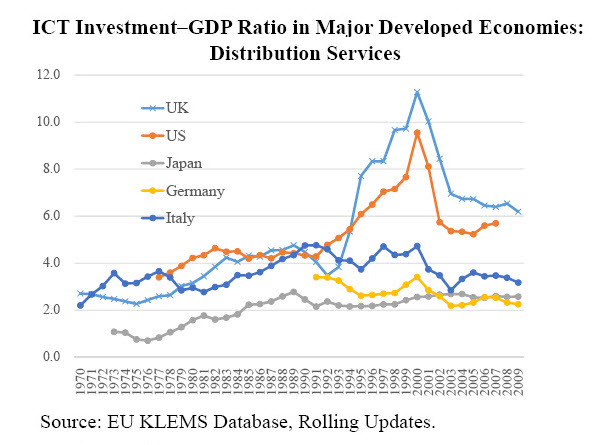 Japan did not reap the benefits of the information, computer and technology revolution as did the US at the dawn of the new millennium. Why that is so is the focus of ongoing research by Professor Kyoji Fukao, Director of the Institute of Economic Research at Hitotsubashi University.
Japan did not reap the benefits of the information, computer and technology revolution as did the US at the dawn of the new millennium. Why that is so is the focus of ongoing research by Professor Kyoji Fukao, Director of the Institute of Economic Research at Hitotsubashi University.
According to Prof. Fukao, productivity growth in the US soared in the mid-1990s and early 2000s as a result of advancements in information, computer and technology (ICT) that were refined and widely adopted by firms in the retail, wholesale, transportation and manufacturing trades. In comparison Japan’s economy suffered a significant slowdown after 1991. This he attributes to comparative underinvestment by Japanese firms in ICT.
For example, the US invested 4 times more than Japan on ICT as a percentage of GDP during the peak IT bubble years in distribution services.
The main cause for the difference, he says, is that US firms see new technologies as a means to innovate. Japanese firms on the other hand perceive them as labor saving techniques that are potentially disruptive to harmony in the workplace.
On closer inspection, the professor found that large US firms often outsource their ICT needs to independent third-party vendors while Japanese companies prefer to build their own ICT divisions. Acting for the Ministry of Education, Trade and Industry (METI), Prof. Fukao interviewed large Japanese companies. He asked them why they didn’t outsource their ICT to third parties. They replied that outsourcing is not allowed under their current employment policies. Rather than lay off workers, firms build ICT vendor-affiliates staffed with employees transferred from other divisions. The new ICT divisions in turn support the old ways of doing business……
While Japan succeeds at maintaining an enviable unemployment rate, it does so at a high price. The professor calculates Japan’s missed ICT revolution costs the nation as much as .73% annually in lost GDP growth. Faced with a stagnant economy, increasing global competition and downward pull on growth from a declining population, one questions if the trade-offs are worth it.
See full article and subscribe to Beacon Reports:
http://beaconreports.net/the-cost-of-japans-missed-ict-revolution/

GREAT POST !! Thank you for the great insight. I've learned from here.
get followers on twitter